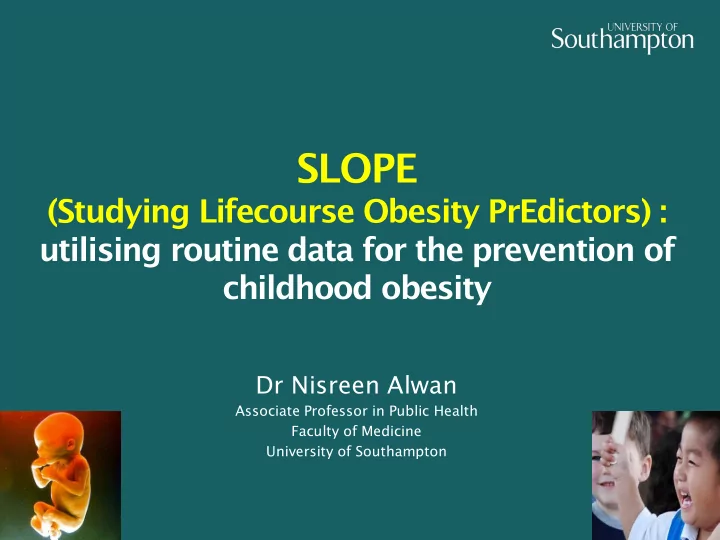

SLOPE (Studying Lifecourse Obesity PrEdictors) : utilising routine data for the prevention of childhood obesity Dr Nisreen Alwan Associate Professor in Public Health Faculty of Medicine University of Southampton
In England .. 2 Source: Public Health England
The developmental origins of obesity Maternal obesity Maternal insulin resistance Social disadvantage Lifestyle and behaviour Environment Pregnancy complications Fetal growth restriction Prematurity Postnatal growth 3
No system-based early identification of obesity risk at pregnancy or infancy stage
Can we use routinely-collected data to quantify childhood obesity risk at an early stage (preconception, pregnancy, infancy) to target preventive interventions? The question is .. 5
The data .. UHS Ordnance Survey 2003-2018 Population- based linked cohort Southern Solent Health Health
30,958 @4/5 74,770 84,219 83,481 14,611 @10/11 19,362 7
Predicting childhood obesity risk: Environmental measures Risk of Maternal factors Area-level index childhood Early life factors obesity MLM of area Socio-demographic factors taking into Physical & built account individual-level confounding environment
Family-centred research Interconception changes Health inequalities
In conclusion .. Routine data Risk score Precision Public Health
n.a.alwan@soton.ac.uk Many thanks to my project team, collaborators & funders: Nida Ziauddeen Academy of Medical Sciences Sam Wilding Wellcome Trust Dianna Smith NIHR Southampton BRC Paul Roderick Primary Care and Population Sciences, University of Southampton Nick Macklon Ordnance Survey Debbie Chase Mark Hanson David Cable Florina Borca Alan Hales Linda Campbell This research is supported by the NIHR Southampton Biomedical Research Centre. Funded by the National institute for Health Research (NIHR), the Centre is a partnership between University Hospital Southampton NHS Foundation Trust and the University of Southampton. The views expressed are those of the author(s) and not necessarily those of the NHS, the NIHR or the Department of Health.
Recommend
More recommend